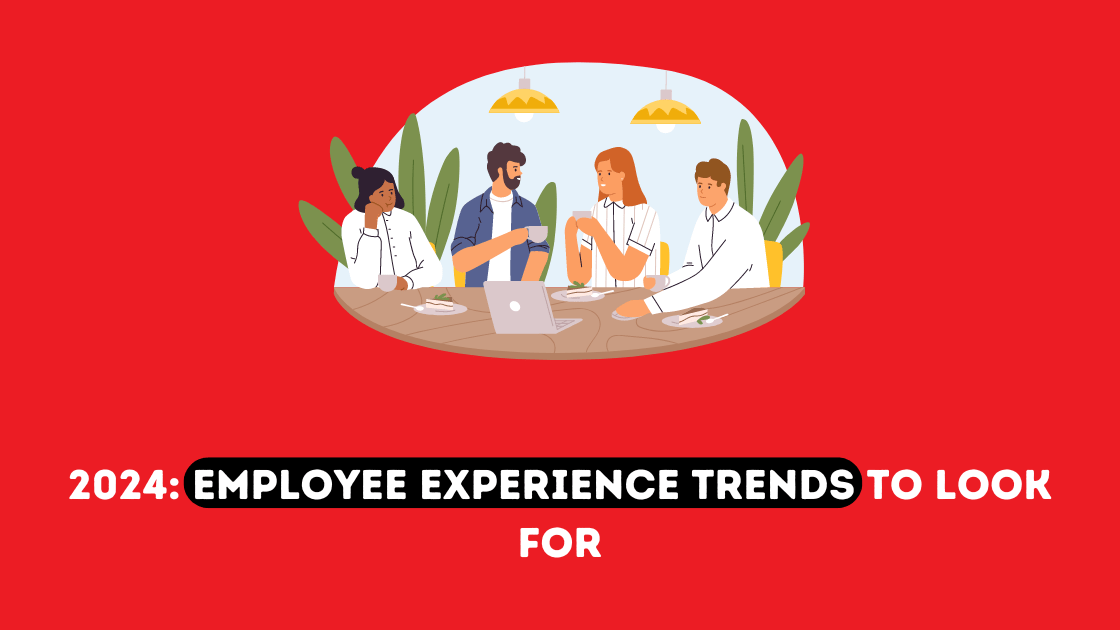The world of work continues to evolve. Many factors are shaping it, including technological advancements and shifting employee expectations. As organizations navigate these changes, understanding the trends shaping the employee experience in 2024 is crucial for attracting and retaining talent. Here are some key trends to watch.
Hybrid work and flexibility are here to stay
The pandemic has permanently changed how we work. In 2024, hybrid work arrangements will remain a dominant trend, where employees split their time between the office and remote locations. Companies are embracing flexibility as a benefit and advantage in retaining top talent.
Employers will continue to refine their hybrid work policies, balancing flexibility with the need for team cohesion and collaboration. It could involve creating flexible work hours or designating specific days for in-person meetings. The aim is to build a flexible environment that supports productivity and employee satisfaction.
Prioritizing emotional well-being
The focus on employee well-being has grown significantly, with a particular emphasis on emotional health. Emotional well-being programs will be central to the employee experience in 2024. These programs may include resources for stress management, mindfulness training, mental health support, and access to counseling services.
Organizations are recognizing that a positive work environment can contribute to higher productivity and a more robust corporate culture. Employers will be encouraged to offer programs that help workers manage stress and enable a healthy work-life balance, read our guide on arranging dinner party for team to increase bonding and productivity on a workspace. Some companies are going beyond traditional programs, introducing innovative initiatives like “mental health days” or providing resources for meditation and mindfulness practices.
Technology to monitor and enhance employee experience
As technology advances, employers increasingly use data-driven tools to monitor and improve the employee experience. In 2024, employee feedback platforms and other monitoring tools will become more widespread. These technologies allow organizations to gather real-time feedback and assess employee engagement.
However, organizations must be mindful of employee privacy concerns as they implement these technologies. It’s crucial to balance monitoring for improvement and respecting employees’ boundaries. Transparency in collecting and using data will be essential to building trust.
Learning and development as a competitive advantage
Employees increasingly seek opportunities for growth within their roles. In 2024, organizations prioritizing learning and development will get a competitive edge. This trend includes providing employees with training programs, mentorship opportunities, and career development resources.
Companies are moving away from traditional, one-size-fits-all training programs and opting for personalized learning paths. This approach allows employees to develop skills that align with their career goals while also contributing to the organization’s success. In-house training platforms and cross-functional project assignments are just a few examples of companies promoting continuous learning.
Diversity, equity, and inclusion (DEI) remain critical
The focus on diversity, equity, and inclusion will be a significant trend in 2024. Organizations are recognizing that diverse teams drive innovation and lead to an inclusive work culture. Companies will invest in DEI programs and create employee resource groups (ERGs) for underrepresented groups.
Organizations must set measurable goals and hold leadership accountable to make meaningful progress in DEI. Transparency in reporting on DEI metrics and involving employees in the process will be essential for success.
A focus on purpose and values
Employees today are seeking purpose and meaning in their work. In 2024, companies that align their corporate values with employees’ values will have a more substantial employee experience. The trend involves creating a workplace culture emphasizing social responsibility and ethical practices.
Organizations committed to positive societal impact will likely attract employees who share those values. It could involve supporting community service projects and adopting sustainable business practices. Aligning corporate values with employee expectations can help companies create a sense of pride and engagement among their workforce.
Continuous feedback and recognition
Traditional annual performance reviews are becoming outdated. In 2024, continuous feedback and recognition will be vital to enhancing the employee experience. Employees want regular feedback on their performance and recognition of their achievements. This trend involves creating a culture of open communication where employees feel valued.
Companies are adopting new performance management tools for ongoing feedback and regular check-ins. The approach creates a more collaborative work environment, increasing employee satisfaction and engagement.
Increased focus on employee autonomy
As remote and hybrid work become more common, employees seek greater autonomy in managing their work. This trend involves allowing employees to make decisions about their work environment and schedules. Organizations recognize that allowing for independence can lead to increased creativity and innovation.
Companies are adopting flexible work policies and encouraging self-management in response to this trend. Employees are given more control over their tasks and projects, which helps create a sense of ownership and accountability. Additionally, technology enables autonomy, with project management tools and collaboration platforms that allow teams to work asynchronously.
Strengthening organizational culture in a hybrid world
Maintaining a solid organizational culture has become more challenging with the rise of remote work. In 2024, companies will focus on building and strengthening culture in a hybrid work environment. This trend includes efforts to keep employees connected and aligned with company values.
Organizations are investing in virtual team-building activities and online collaboration tools to achieve this. The goal is to build a cohesive culture bridging the gap between remote and in-office staff. Companies are also reimagining office spaces as hubs for collaboration and socialization.
Bottom line
A variety of factors will shape the employee experience in 2024. It includes everything from flexible work arrangements and emotional well-being programs to technology that monitors and enhances employee satisfaction. Organizations that prioritize employee well-being, diversity, and inclusion will be in a better position to retain top talent. Understanding and embracing these trends can help companies create a workplace that meets the needs of employees and drives business success.

